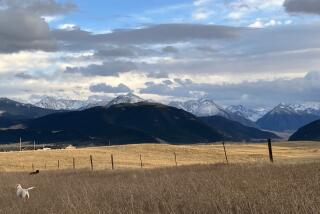In Petroleum County, Population 518, Isolation Is a Cherished Way of Life : Montana: Residents of the least-populous area in the state cite the virtues of a slow pace, little pollution and few crimes. Still, they are eager to roll out the red carpet for visitors.
- Share via
WINNETT, Mont. — The Northern Hotel has 14 rooms, with rates starting at $12 a night. Of course, proprietor Joe Pease says he has gone as long as 40 consecutive nights without a guest.
“It’s mostly hunters,” he said. “We get an occasional tourist, but they have to be pretty well forced to stay by car trouble or bad weather. Who wants to stay in a hotel with no bathroom and no color TV?”
And who else would have reason to spend a night in Petroleum County, population 518, 1,869 miles of ranchlands and oil fields, Montana’s least-populous county and the sixth most sparsely populated county in the nation?
In a world that seems increasingly crowded, the wide-open spaces of Petroleum County survive, and its people hold on to their isolation--living on ranches, working in businesses in the town or teaching its children.
“I’ve lived in open country all my life,” Pease said. “You can go to a high hill and see for 30 miles. You know all the ranches. You know the creek, because you’ve been there. It’s beautiful.”
His neighbors cite the virtues of solitude--a slow pace, little pollution, few crimes. Still, Petroleum County is eager to roll out the red carpet for visitors. “People always compliment us for our hospitality,” said Postmaster LuAnn Knutson, a lifelong resident.
For those who have cosmopolitan tastes, the county offers Winnett, the county seat and home to 191 souls.
Winnett has two gas stations, two food markets, two bars, one cafe (another will open soon), a liquor store and the hotel. There are four churches and a school, which serves as the library and community center.
“Winnett is booming,” said Mayor Gary Gershmel.
People point with pride to the new emergency services building, which houses the volunteer fire department, ambulance and city offices along with the local Soil Conservation Service office.
Gershmel said the town has “a lot of things going.” He’s owner of Gershmel’s General Store, the town’s largest grocery. A recent visitor found him working with his family on a restaurant addition that will seat 40 and offer pool tables and video games.
Gershmel tells how he got out of the ranching business half a dozen years ago “with practically nothing” and decided to try making a go of it in town. “We’re surviving,” he said. “We’re borrowing to put this addition on. We’ve been doing pretty good in the store.”
A Billings developer is putting up a six-unit complex for retirees; the elderly make up at least a quarter of the local population, said Bonnie Allen.
Allen is one of seven full-time county employees, and her collection of titles is another indication of just how few people live here--she serves as county clerk, court clerk and county election supervisor.
In the oil boom of the 1920s, Petroleum County had a population of more than 3,000, Allen said. But the number has been dwindling ever since.
The county, despite its name, does not rank among the state’s leading producers of oil and gas. Few new people have moved in and most everyone you meet in Winnett was born and reared in the county.
“It’s an excellent place to live and raise a family,” Allen said. But despite the recent flurry of construction, little is happening to create new jobs and attract outsiders, she said.
“As the economy goes down, the population goes down,” she said.
The rest of the full-time county work force consists of Coffey’s assistant, a three-person highway department and the sheriff, who also is the coroner. A justice of the peace is elected; a part-time county attorney is appointed.
The multiple titles are a necessity. “I think it’s a lot more cost-efficient” said Allen. “It’s economically feasible to do it this way.”
More to Read
Sign up for The Wild
We’ll help you find the best places to hike, bike and run, as well as the perfect silent spots for meditation and yoga.
You may occasionally receive promotional content from the Los Angeles Times.






